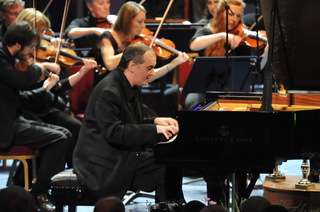|
Back
Prom 20 London
Royal Albert Hall
07/31/2009 -
Igor Stravinsky: Pulcinella
Robert Schumann: Piano Concerto in A minor Op. 54
Felix Mendelssohn: Symphony No.5 “Reformation” Op. 107
Nicholas Angelich (piano), Karen Cargill (mezzo-soprano), Andrew Staples (tenor), Brindley Sherratt (bass)
Scottish Chamber Orchestra, Yannick Nézet-Séguin (conductor) 
N. Angelich (© Chris Christodoulou)
Pulcinella was the hero of many comic episodes from the Neapolitan commedia dell'arte tradition. The ballet Pulcinella was originally the idea of Russian impresario Sergey Diaghilev and his protégé, the dancer and choreographer Léonide Massine, who became fascinated by the half-comic, half-tragic character after encountering him in Neapolitan puppet theatres. For the music to this ballet, Diaghilev commissioned Stravinsky to arrange and orchestrate a recently-discovered trove of music by 18th century composer Pergolesi (although it later transpired that a substantial proportion of this had been misattributed). Stravinsky read the music and “fell in love” with it, and so his neo-Classical period began. Diaghilev may not have been altogether pleased with Stravinsky's melding of 18th century melodies with his own subtly distorted harmonies and distinctive irregular rhythmic patterns, but to a contemporary ear it is this blend which is of such interest and appeal – a blend of styles brought out well by the Scottish Symphony Orchestra under the baton of Yannick Nézet-Séguin.
This was the young Nézet-Séguin's first appearance at the Proms, and in his enthusiasm for the occasion he quite made up for the lack of ballet dancers by positively dancing on the podium, spending much of the time on tip-toes, sometimes crouching almost below his stand or, on expansive sweeping gestures, with his feet leaving the ground entirely. This supremely high level of energy was infectious, judging by the lively and full-bodied playing of the orchestra throughout the performance. Particularly effective in this piece were the contrasts between the rhythmic elements (such as the stabbing string chords reminiscent of The Rite of Spring) and the long legato lines of Pergolesi (exemplified by the oboe solos in the haunting Serenata, performed stunningly tonight by Rosie Staniforth). Also particularly noteworthy was David Watkin's cello in the concertino sections.
Of course, the Pulcinella score also requires singers for a series of brief 'arias', again based on commedia dell'arte libretti but only tenuously connected to the story. Tenor Andrew Staples began by taking over the oboe melody in the Serenata, and demonstrated highly musical phrasing, with a rich tone that was full-bodied without heaviness. This was shortly followed by Mezzo Karen Cargill, again producing some lovely sounds, particularly in the lower register – although in higher passages sometimes a little too forceful for the delicate textures of the piece. Having heard and greatly enjoyed bass Brindley Sherratt's recent Pimen (Boris Godunov at the ENO, 2008), the brief Con queste paroline did not exactly afford much opportunity to show off his voice to its full advantage; however, when the score permitted, he still managed to fill the hall with some stunning resonant low notes.
Schumann's Piano Concerto in A minor has been a Proms favourite over the years, recently passing the 100 performances mark. Innovative at the time of composition, it rejected the old “Biedermeier” style of piano concerto, where virtuosic showmanship was of the greatest importance, replacing it with a more integrated form where, in Schumann's own words, “the soloist . . . may unfold the wealth of his instrument and his art, while the orchestra, no longer a mere spectator, may interweave its manifold facets into the scene”. The SCO, now enhanced by clarinets and percussion, were indeed much more than an accompaniment for Nicholas Angelich's expressive yet never showy, and clearly heartfelt playing, sometimes with the orchestra supporting the piano, sometimes vice versa, and sometimes with the piano in dialogue with a particular instrument (for example, the long clarinet passages in the first movement, performed tonight by Maximiliano Martin).
The final work of the evening continues the 2009 Proms season's bicentenary survey of Mendelssohn's symphonies with the one published as No.5 (although being composed in 1830, it was actually his second). The orchestra, as always, injected great energy into the Allegro con fuoco in the first movement, but – perhaps, ironically, because of their superb level of ensemble playing – the feelings of struggle and strife normally associated with this movement were not so evident. However, overall, Nézet-Séguin and the SCO excelled at building up and maintaining tension and forward motion, while interspersed with periods of temporary relaxation, such as the upper strings' serene shimmering in the Dresden Amen quotations (also familiar as Wagner's “Grail” leitmotiv in Parsifal). The final movement began with the woodwind calmly stating Luther's great Reformation hymn “Ein' feste Burg ist unser Gott” (from which the symphony gets its title Reformation), was then joined by the rest of the orchestra for some energetic counterpoint, culminating in an exuberant “victory march” – quite appropriate for Nézet-Séguin's victorious Proms debut.
The Scottish Chamber Orchestra
Carla Finesilver
|